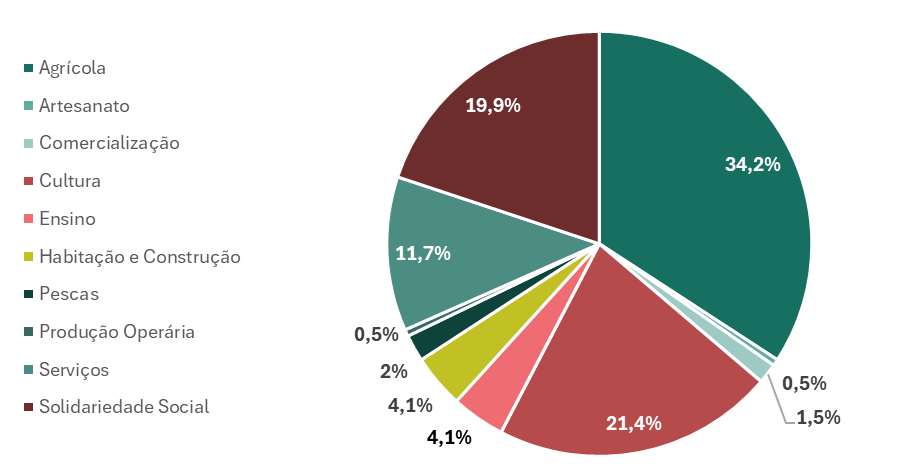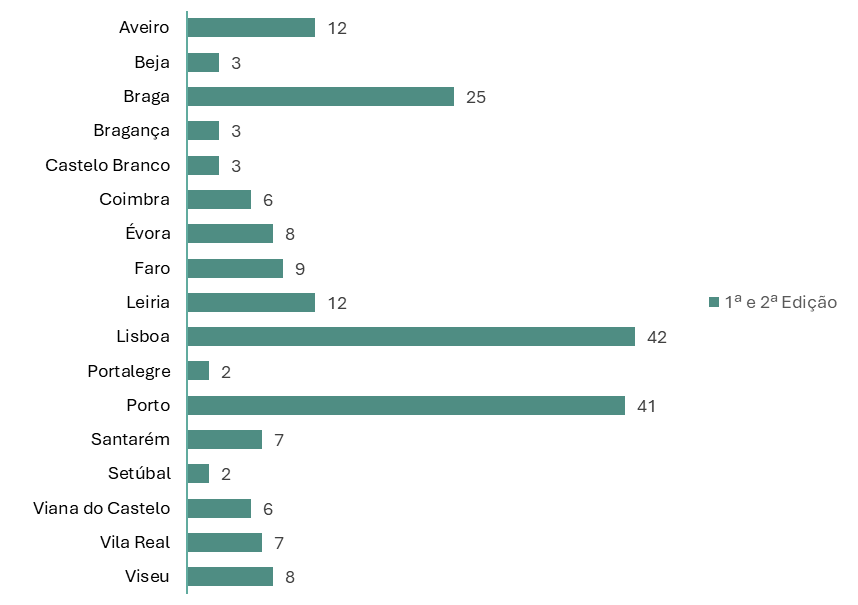Library
20 May 2025
International Year of Cooperatives 2025: Modernisation, Sustainability and Innovation in the Cooperative Sector
Library
20 May 2025
Financing the ecosystem
Transformative Digital Transition
Working conditions and governance
+13 more
Login / create an account to be able to react
-
18

The year 2025 marks the International Year of Cooperatives (IYC2025), proclaimed by the UN, emphasizing the enduring importance of cooperatives for global social and economic development and for achieving the Sustainable Development Goals. Under the motto "cooperatives build a better world," the UN resolution highlights the role of cooperatives in promoting economic and social participation, eradicating poverty and hunger, creating decent employment, fostering education, providing social protection, and ensuring financial inclusion.
In Portugal, CASES (António Sérgio Cooperative for the Social Economy), which succeeded INSCOOP in 2010, plays a crucial role in fostering and supporting the cooperative sector. In 2022, CASES launched the Cooperative Support Programme (PAC), aimed at promoting the establishment and modernization of cooperatives. PAC Measure 1 ("Constitute & Pursue") supports the administrative costs of new cooperatives, while Measure 2 ("Innovation & Digitalization") focuses on digital modernization.
PAC Measure 2, accounting for 96% of the financial support in 2022 and 2023, has been vital for the digitalization of the cooperative sector, which previously showed low indicators in this area according to earlier studies. This measure supported 196 applications, primarily from micro-entities, across various activity branches such as Agriculture, Culture, Social Solidarity, and Services, with a geographical distribution aligned with the national cooperative sector. The most significant investments through this measure were in computer equipment, website creation/renovation, and software.
The PAC aligns with UN recommendations to enhance cooperative capacity building and access to new technologies. For IYC2025, the PAC will see an increased budget allocation and a new promotion modality.
The text concludes that the intrinsic characteristics of cooperatives, such as democratic governance, non-speculative nature, and focus on the 7th Cooperative Principle (Concern for Community), offer a competitive advantage in responding to the increasing demands of a global market and ESG (Environmental, Social, and Governance) metrics. Their structure and values attract talent seeking careers with positive social and environmental impacts, making IYC2025 an opportunity to highlight the modernizing and sustainable potential of cooperativism.
CASES - Cooperativa António Sérgio para a Economia Social
CASES - Cooperativa António Sérgio para a Economia Social
Topics
Portugal
Social Economy Entity
-
Thematic area
-
-
Financing the ecosystem
-
Transformative Digital Transition
-
Working conditions and governance
-
-
Interlinkages with other sectors
-
-
Proximity and social economy
-
Agri-food
-
Digital
-
-
Action areas and keywords
-
-
Access to Finance
-
Access to technology
-
Addressing capacity and skills gap
-
Boosting digital skills by - and in the social economy
-
-
Ecosystem focus
-
-
Proximity economy
-
Social economy
-
-
Scope of activity
-
-
International
-
Local/neighbourhood
-
National
-
Regional
-
Share
International Year of Cooperatives 2025: Modernisation, Sustainability and Innovation in the Cooperative Sector
2025 marks the International Year of Cooperatives (IYC2025), proclaimed by the United Nations (UN). This date is all the more relevant as this year is the second International Year of Cooperatives - the first was celebrated 13 years ago, in 2012 - demonstrating the persistence of the relevance of cooperatives worldwide, namely their contribution to the implementation of the Sustainable Development Goals and to global social and economic development.
The motto of the AIC2025 is: cooperatives build a better world. Indeed, the UN Resolution on cooperatives in social development[1] recognizes that cooperatives, in their various forms, promote the widest possible participation in the economic and social development of local communities and of all people, including women, youth, the elderly, persons with disabilities and indigenous peoples, whose inclusion enhances economic and social development. and contributes to the eradication of poverty and hunger. The Resolution also draws the attention of governments to the recommendations of the 2023 report of the United Nations Secretary-General on cooperatives in social development[2], to focus support on cooperatives as sustainable and successful business entities, strengthening the entrepreneurial ecosystem of cooperatives, enabling them to contribute directly to the creation of decent employment, eradication of poverty and hunger, education, social protection – including universal health coverage, financial inclusion and the creation of affordable housing options for various economic sectors in urban and rural areas.
In 2010, CASES - António Sérgio Cooperative for the Social Economy succeeded INSCOOP - António Sérgio Institute of the Cooperative Sector, a public institute, in all its rights, obligations and public powers of authority, as well as in the pursuit of its public service purposes and attributions, including "fostering the qualitative and quantitative expansion of the cooperative sector, ensuring compliance with cooperative principles and contributing to the coordination of the Administration's activities with a focus on the cooperative sector."
In 2022, CASES launched the Cooperative Support Programme (PAC - Programa de Apoio às Cooperativas), with the aim of promoting the establishment and modernisation of cooperatives, through the granting of financial support to share the administrative costs arising from the procedures for setting up, amending the statutes and registering the members of the Governing Bodies (Measure 1), as well as the expenses inherent to internal digital innovation processes (Measure 2).
PAC Measure 1 – Constitute & Pursue – has unsurprisingly proved particularly important for newly created cooperatives, which make up almost half of the projects supported. It is also important to note that, of the total of 100 cooperatives set up in 2022 and 2023 in mainland Portugal, 32 used this measure.
Measure 2 - Innovation & Digitalization, which accounted for 96% of PAC financial support in 2022 and 2023, and of which we will make a brief more detailed analysis, has attracted applications from a wide variety of cooperatives.
In fact, the modernization of cooperatives, in particular through digitalization processes, is an identified need. This is reflected not only in the Social Economy Sector Survey[3], in which it is found that cooperatives were the social economy family that had the lowest indicators in this field - less than half had a website and used social networks; but also in the CASES Study Digital transformation and participation of cooperators in the Portuguese Cooperative Sector [4], which identifies a desire to move towards digitalisation, but without distorting the desire to ensure full inclusion and sustainable growth.
Accordingly, axis 2 of the PAC aims to promote the modernisation of cooperatives, in order to better respond to the socio-economic needs of their members and the population in general.
It is observed that this measure supported, in 2022 and 2023, 196 applications, in particular from micro entities, although cooperatives of all sizes were supported – Figure 1. Regarding the branches of activity, there is greater support for the four largest branches of the cooperative sector in mainland Portugal, namely, the Agriculture (34.2%), Culture (21.4%), Social Solidarity (19.9%) and Services (11.7%) branches – Figure 2.

Figure 1. Distribution of applications supported by Measure 2, by Cooperative Size (Turnover)

Figure 2. Distribution of applications supported by Measure 2, by Main Branch, 1st and 2nd Edition PAC
Although with a wide geographical dispersion, the supported cooperatives are mostly based in large urban centers, especially the districts of Lisbon (21%), Porto (20%) and Braga (13%), which corresponds to the national distribution of the cooperative sector by region – Figure 3. It should also be noted that, although most of the cooperatives analysed are on average 32 years old, the range of supported cooperatives varies from centenary cooperatives to newly constituted ones.

Figure 3. Distribution of applications supported by Measure 2, by District
Measure 2 of the PAC supports the following items: website creation/renovation; standard or specific software; design and registration - creation of new brands or collections; computer equipment; and studies, diagnoses, audits and marketing and communication plans. Regarding the investments made by cooperatives in these areas, €490,000 were for computer equipment, representing about 52% of the total investment made. The creation and renovation of the website had an investment of €222,000, that is, about 24% of the investment, and, on an equally relevant scale, is the software item, with about €146,000 (16%) of the investment.
It can thus be seen that Measure 2 of the PAC covered cooperatives of the entire national spectrum, that is, in almost all branches of activity (except for Credit and Consumers), districts, size and levels of seniority, which demonstrates that this measure, despite the amounts in question not being particularly large - up to €4,000 per application - is, nevertheless, useful and sought after by the entire cooperative sector, in a transversal way.
The PAC is part of the response to the challenges of the UN, which in paragraph 12 of the aforementioned resolution "Calls on governments, in collaboration with the cooperative movement, to develop programmes aimed at improving the capacity building of cooperatives (...) and to introduce and support programmes aimed at improving cooperatives' access to new technologies;".
In addition, in 2025, within the scope of the International Year of Cooperatives, the PAC has increase in its budget allocation and a new modality was created for the promotion and dissemination of the activity of each cooperative and of the cooperative model. The IYC2025 programme also provides for other activities aimed at the modernization of the sector, such as the creation of a website for the dissemination of innovative examples and good practices and conferences on contemporary issues relevant to cooperativism.
It is also important to consider how the cooperative sector seeks to rethink its own model, taking into account the modernisation of the entire economic fabric, and in particular agriculture, and the compatibility between the principles of cooperativism and the response to an increasingly open and global market.
An increasingly open and global market brings growing digital and modernization demands, encouraging the demand by cooperatives, especially agricultural cooperatives, for the integration of solutions of this type, as the analysis above points out. But it has also been gradually incorporating ESG sustainability metrics - Environmental, Social and Governance - requiring greater accountability and transparency from its agents, as demonstrated by the European regulatory framework for sustainability, so we leave a final note on this topic.
We believe that the intrinsic characteristics of the governance of cooperatives, as well as the principles and values by which they are governed, and which are their distinctive mark in relation to other organisational forms, may constitute an advantage in the approach to these matters. Cooperatives are, by definition, created to meet the needs of their members, having specific governance characteristics, including: they are owned by the members, the decision-making is democratic, they are non-speculative and impose limits on the distribution of profits/surpluses, elements that contribute to the sustainability and transparency of these organizations and their activity.
Regarding social and environmental issues, cooperatives have in the 7th Cooperative Principle – Concern for Community – a guideline that defines that they work in favor of the sustainable development of their communities through policies approved by the members. This principle should be fulfilled, in accordance with the guidance notes for the cooperative principles of the International Cooperative Alliance[5], through sustainable social development, commitment to peace and social justice, concern for employees, youth, sustainable economic development and environmental sustainability.
At the same time, it should not be forgotten that younger generations are increasingly keen in pursuing careers with positive social and environmental impacts. According to the 2022 OECD report on youth-led social enterprises[6], the 2021 Youth Eurobarometer survey finds that young people (aged 16-30) prioritise pursuing careers where they can achieve goals such as fighting poverty and inequality, fighting climate change or reducing unemployment. It also notes that nearly half of 17-26-year-olds surveyed in 45 countries in Africa, the Americas, Asia-Pacific, Europe and the Middle East are making choices about the types of jobs and organizations they will work for based on their ethics, and that 40.6% of 18-35 year-olds globally consider a sense of purpose or impact on society to be a of the most important criteria when considering employment opportunities.
That is why a greater focus on the implementation of the principles and values of cooperativism, revitalizing concepts such as democracy, solidarity, equity, transparency and concern for the community and the environment can prove to be a real competitive advantage, which attracts talent and innovation, with the International Year of Cooperatives 2025 being an opportunity to highlight this modernizing potential.
Filipa Farelo, Edna Neves, Eduardo Pedroso
CASES - Cooperative António Sérgio for Social Economy (www.cases.pt)
[1]https://undocs.org/Home/Mobile?FinalSymbol=A%2FC.3%2F78%2FL.11&Language=E&DeviceType=Desktop&LangRequested=False
[4] https://cases.pt/estudo-cases-transformacao-digital-e-participacao-dos-cooperadores-no-setor-cooperativo-portugues-2/
[6] OECD (2022), "Unlocking the potential of youth-led social enterprises", OECD Local Economic and Employment Development (LEED) Papers, No. 2022/11, OECD Publishing, Paris, https://doi.org/10.1787/d5bddad8-en.
Comments (0)
See also
-
31
Understanding the Proximity and Social Economy Industrial Ecosystem
- Categories
- Partnerships Regenerative Green Transition Skills +65 more
-
58
Employee Ownership: an intergenerational industrial transition and inclusive growth model
- Categories
- Partnerships Skills Working conditions and governance +47 more
-
29
Financing the Ecosystem Recap: December – January
- Categories
- Partnerships Regenerative Green Transition Skills +68 more




